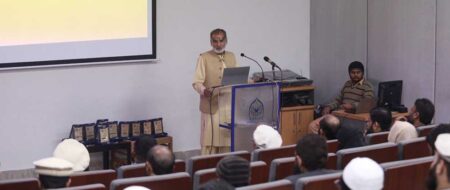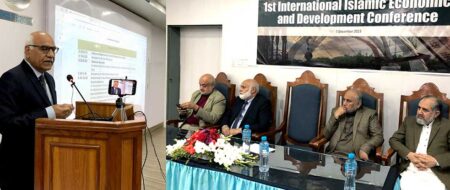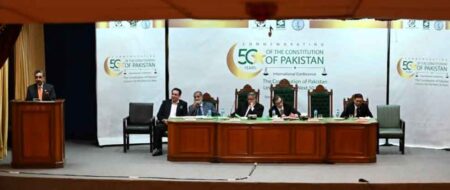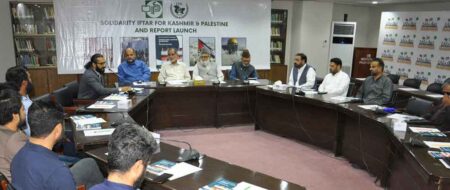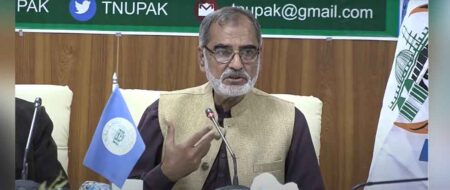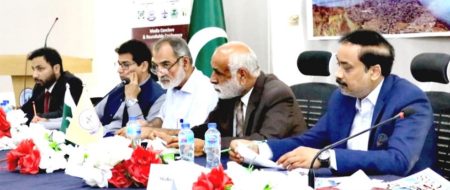Towards Energy Secure Pakistan Road to Recovery and Sustainability – Agenda for Action
Tawanai Program of Institute of Policy Studies, Islamabad organized a full-day conference on 18 September 2013 themed “Toward an Energy Secure Pakistan: Road to Recovery & Sustainability – Agenda for Action” aimed to develop and generate a broad based policy, technical and legal response,
Tawanai Program of Institute of Policy Studies, Islamabad organized a full-day conference on 18 September 2013 themed “Toward an Energy Secure Pakistan: Road to Recovery & Sustainability – Agenda for Action” aimed to develop and generate a broad based policy, technical and legal response, i.e., an agenda for action to initiate an effective response to overcome the looming energy crisis of the country. The Conference was addressed by Ahsan Iqbal, Federal Minister for Planning and Development, among others, Mirza Hamid Hassan, chairman IPS Tawanai Program and former secretary water & power, Dr Gulfraz Ahmad, former secretary for petroleum & natural resources, Khalid Rahman, DG-IPS, Dr Joseph Wilson, chairman, Competition Commission of Pakistan, Arif Allauddin, managing director, ENERCON, Zafar-ul-Hassan Almas, chief macroeconomics, Planning Commission, Salahuddin Rifai, senior energy consultant, Salman Azad, director, Punjab Power Development Board, and Dr Saeed Jadoon, head of reservoir engineering, OGDCL and Dr. Vaqar Ahmed, Deputy Executive Director, Sustainable Development Policy Institute (SDPI). A set of recommendations made in the light of conference proceedings, were presented in the concluding sessions of the conference. A comprehensive report of the conference will also published.
It was recommended that Planning Commission should develop an integrated energy policy with the consultation of NEPRA, OGRA, Ministry of Water and Power and Petroleum along with other important stakeholders including ministry of finance DISCOs, GENCOs, IPPs and Industry. A workshop can be held for soliciting views of all stakeholders. The policy then tabled for the final approval from CCI after Cabinet’s approval hence achieving a National Energy Plan to put off the current state of energy crisis from the country.

Proceeding to the next step after formulation, CCI secretariat should be established as a coordinating body for implementation and monitoring affairs with respect to key sector issues. This separate Sectt. is otherwise required under the 18th Amendment, as well. Periodic review of NEP by Planning Commission and implementation and modification reports to be submitted to CCI for corrective measures.
For the decision making purpose an institution is required that will regulate the policy for being implemented, may be the Ministry of Energy with current ministries being under it. Governance and implementation will be the key of assessment of the performance for improvement. Capacity building of ministerial staff, changes in rules of business, appointment of relevant subject people in the ministry should be a pre-requisite.
Role of both NEPRA and OGRA to be reviewed and adjusted according to energy sector reforms agenda. These reforms should be establishing autonomy, improved system of appointment of members; legal changes to set up system of accountability.
Medium to Long term Energy Sector Projects for power generation should be identified for energy supplies and energy evacuation in the light of IEP while taking account of all contingencies.
Key Points for an Integrated Energy Plan.
- First and the foremost requirement for Integrated Energy Policy should be the establishment of linkage between power and oil & gas policies and to link all minor policies which are described below.
- Power Policy 2013-18 must be revised or sector reform policy to be announced to speed up energy sector reforms with firm time lines. Power Generation Policy to promote indigenization and transfer of technology to generate power from different resources through locally manufactured machines.
- Renewable Energy Policy to particularly also talked about promotion of its uses by industry through tax rates.
- Circular Debt Resolution Policy in consultation with all stakeholders is a must, as a recent move to pay to IPPs has become controversial in the wake of its re-surfacing and inability of the GOP to resolve on long term basis.
- Power Sector leakages reduction program to be initiated in generation, distribution and transmission
- Generation –efficient running of plants and no fuel leakage,
- Distribution – Distribution Losses to be lowered through requisite investments (ELR) with the approval of NEPRA (Rs. 90 bln/anum saving @ 5 % reduction)
- Catching theft
- Transmission – Transmission System losses to be reduced based on programs approved by NEPRA – T&D Losses reduction investment to be made part of tariff
 |
 |
 |
 |
- Strict recovery mechanism to be enforced by DISCOs, being regulator NEPRA should approve and monitor the recoveries. It was suggested that DISCOs should be given the financial autonomy for payments. Maximum possible grace periods should be recommended in payment terms in order to avoid late payment charges and high interest rates.
- Liberalization policy of Oil & Gas Sector market should be synchronized with IEP. Review of gas allocation policy, implementation review of petroleum policy, shale gas policy, LNG Imports is must.
- Energy Conservation to be implemented by passage of energy conservation policy and law promoting features like energy audits, reducing energy intensity processes in industries by making them efficient and provisioning of tax or other incentives etc. ENERCON to be transformed into a result oriented entity with officers rewarded upon efficiency gains etc.
- For conservation standardization of energy efficient equipments is obligatory, Pakistan Standard Quality Control Authority (PSQCA) should be working accordingly moreover independent audit companies should be registered to share the work load and increased efficiency.
 |
 |
 |
 |
It was also suggested that constitution of regulatory benches in the high courts of Pakistan, with judges having knowledge of the energy sector and induction of particular courses to understand energy sector can also be initiated by judicial academies and bar associations to review and hear the energy sector related hearings.
A recommendation was made to reduce the interest rate for power sector to a reasonable level for its viability. Reduction of the same for KESC from the similar figure down to about 7.5% by federal government is a good reference.
Consensus was made that National Power Construction Corporation (NPCC) should calculate the precise quotas of Load shedding. These quotas may be strictly followed by DISCOs without consideration of VIP culture.


